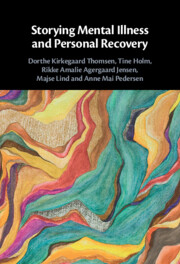Book contents
- Storying Mental Illness and Personal Recovery
- Storying Mental Illness and Personal Recovery
- Copyright page
- Contents
- Figures
- Tables
- Acknowledgments
- Chapter 1 Introducing the Book
- Chapter 2 The Science of Mental Illness
- Chapter 3 Vulnerability, Stress, and Burden in Mental Illness
- Chapter 4 Recovery and Mental Illness
- Chapter 5 Narrative Identity
- Chapter 6 Narrative Identity, Illness, and Well-Being
- Chapter 7 How Did We Collect and Analyze the Life Stories?
- Chapter 8 Overview of Narrative Identity Themes from the Initial Analyses
- Chapter 9 Relationship Themes in Narrative Identity
- Chapter 10 Self Themes in Narrative Identity
- Chapter 11 Functional-Level Themes in Narrative Identity
- Chapter 12 Treatment Themes in Narrative Identity
- Chapter 13 Summary and Synthesis
- Chapter 14 Understanding the Interplay between Narrative Identity and Mental Illness: A Framework
- Chapter 15 Tools for Narrative Repair
- Conclusion
- Book part
- References
- Index
Chapter 10 - Self Themes in Narrative Identity
Published online by Cambridge University Press: 02 February 2023
- Storying Mental Illness and Personal Recovery
- Storying Mental Illness and Personal Recovery
- Copyright page
- Contents
- Figures
- Tables
- Acknowledgments
- Chapter 1 Introducing the Book
- Chapter 2 The Science of Mental Illness
- Chapter 3 Vulnerability, Stress, and Burden in Mental Illness
- Chapter 4 Recovery and Mental Illness
- Chapter 5 Narrative Identity
- Chapter 6 Narrative Identity, Illness, and Well-Being
- Chapter 7 How Did We Collect and Analyze the Life Stories?
- Chapter 8 Overview of Narrative Identity Themes from the Initial Analyses
- Chapter 9 Relationship Themes in Narrative Identity
- Chapter 10 Self Themes in Narrative Identity
- Chapter 11 Functional-Level Themes in Narrative Identity
- Chapter 12 Treatment Themes in Narrative Identity
- Chapter 13 Summary and Synthesis
- Chapter 14 Understanding the Interplay between Narrative Identity and Mental Illness: A Framework
- Chapter 15 Tools for Narrative Repair
- Conclusion
- Book part
- References
- Index
Summary
In Chapter 10, we analyze how mental illness impacted selfhood and how aspects of the self were narrated with well-being. Our participants shared stories reflecting an ill self with chaos, division, and lack of self-care; a negative self; and a self that was different, unable to live a “normal” life. They voiced a loss of previous self and imagined a future that was uncertain and bleak, with decline and relapse lurking at the edge. Grounded in these subthemes, identity conclusions such as “I am out of control” and “my illness will shatter my dreams” may move to the forefront of narrative identity, hindering personal recovery. Some participants also evidenced subthemes concerning how mental illness had changed them in positive ways, focusing on insight and strengths. When they storied well-being into their identities, this included subthemes revolving around themselves as agentic, growing, accepting, and valued as well as future selves reflecting hopes and dreams. From these subthemes, identity conclusions like “I can change my life for the better” and “I can learn” may sprout. Reconstructing narrative identity to cope with the costs of mental illness, while vitalizing adaptive aspects of the self may be central to personal recovery.
- Type
- Chapter
- Information
- Storying Mental Illness and Personal Recovery , pp. 133 - 155Publisher: Cambridge University PressPrint publication year: 2023



